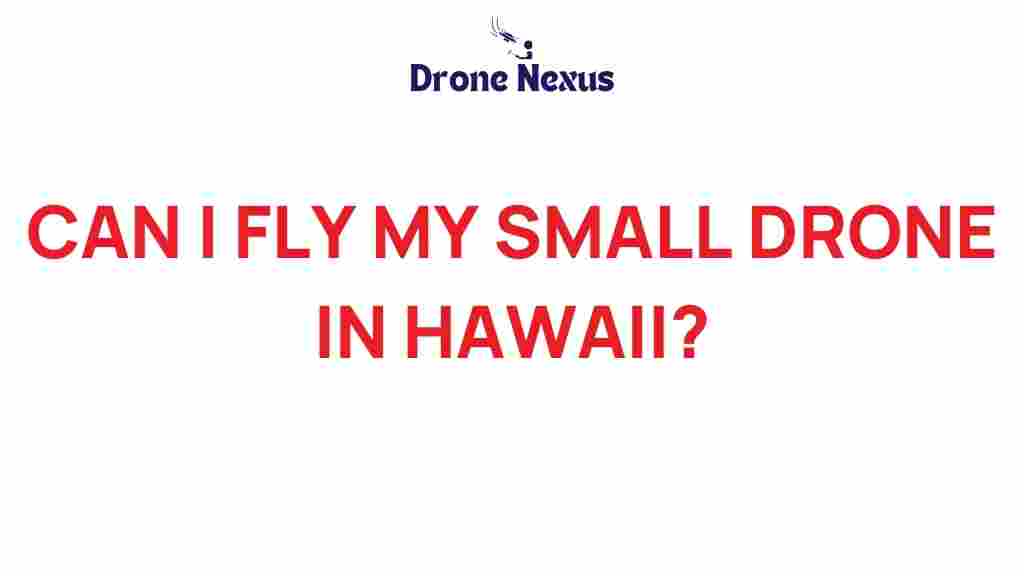Can You Fly Your Small Drone in Hawaii? Understanding Drone Regulations
Hawaii, known for its breathtaking landscapes and stunning beaches, is a drone enthusiast’s paradise. However, before you launch your small drone into the sky, it’s crucial to understand the drone regulations that govern flying in this beautiful state. In this article, we’ll explore the rules and guidelines for flying drones in Hawaii, ensuring that you can capture those picturesque views while staying compliant with local laws.
Understanding Drone Regulations in Hawaii
Drone regulations in Hawaii are enforced at both the federal and state levels. The Federal Aviation Administration (FAA) provides overarching regulations that apply across the United States, while Hawaii has additional rules that cater to its unique environment and cultural significance. It’s essential to be aware of both sets of regulations to ensure a safe and lawful flying experience.
Federal Drone Regulations
Before diving into state-specific rules, let’s outline some key federal regulations set by the FAA:
- Registration: All drones weighing more than 0.55 pounds must be registered with the FAA.
- Altitude Limit: Drones must not fly higher than 400 feet above ground level.
- Line of Sight: Pilots must maintain visual line of sight with their drone at all times.
- No Flying Over People: Avoid flying over crowds or people who are not involved in the operation.
- Airspace Restrictions: Be aware of controlled airspace and avoid flying near airports or other restricted areas.
State-Specific Regulations in Hawaii
In addition to federal regulations, Hawaii has its own set of drone regulations that reflect the state’s commitment to safety and preserving its natural beauty. Some important state regulations include:
- County-Specific Rules: Each county in Hawaii may have its own additional rules regarding drone use, so always check local ordinances.
- Protected Areas: Drones are prohibited in certain protected areas, including national parks and historical sites.
- Privacy Laws: Be mindful of privacy laws when flying your drone, especially when capturing images or videos of individuals.
Step-by-Step Process for Flying Your Drone in Hawaii
Now that you have a grasp of the regulations, here is a step-by-step process to help you fly your drone legally and responsibly in Hawaii:
1. Register Your Drone
If your drone weighs more than 0.55 pounds, make sure to register it with the FAA. This can be done easily online through the FAA’s official website.
2. Research Local Regulations
Before you head out to fly, check the specific drone regulations for the county you will be in. Each county in Hawaii may have different rules. For example, Hawaii County has specific regulations that may vary from those in Maui County.
3. Check for Restricted Areas
Use resources like the FAA’s B4UFLY app to identify any restricted airspace or areas where you may be prohibited from flying. This includes airspace near airports, military bases, and some national parks.
4. Plan Your Flight
Before taking off, plan your flight path. Consider the weather conditions, time of day, and potential obstacles. Make sure you have a safe area to land your drone if needed.
5. Fly Responsibly
When flying, adhere to all federal and state regulations. Maintain visual line of sight, do not exceed altitude limits, and avoid flying over people or sensitive areas. Respecting these guidelines will enhance safety for both you and others.
6. Respect Privacy
Always be conscious of privacy laws. Avoid capturing images of individuals without their consent, and be respectful of private property. If you inadvertently capture someone’s image, consider deleting it if they request it.
Troubleshooting Tips for Drone Pilots
Even the most experienced drone pilots can encounter issues. Here are some common troubleshooting tips:
1. Loss of Signal
If your drone loses signal, it may automatically return to its takeoff point. To avoid this, ensure your drone’s batteries are fully charged and check for any potential obstructions before flying.
2. Battery Life Management
Monitor your drone’s battery life closely. Plan your flights with enough time to return safely before the battery runs out. Consider carrying spare batteries if you plan to fly for an extended period.
3. GPS Issues
Sometimes, drones may have difficulty connecting to GPS satellites. Ensure you are flying in an area with a clear view of the sky to improve GPS signal strength.
4. Software Updates
Regularly check for software updates for your drone. Manufacturers frequently release updates to improve performance and fix known issues.
5. Follow Local Recommendations
Stay informed about local drone flying tips from community groups or forums. Engaging with other drone enthusiasts can provide valuable insights and help you navigate any challenges.
Conclusion
Flying your small drone in Hawaii can be a fantastic experience, offering stunning views and unforgettable moments. However, it’s imperative to adhere to drone regulations to ensure safety and compliance. By understanding both federal and state-specific rules, registering your drone, and planning your flights responsibly, you can enjoy the beauty of Hawaii from above.
Always remember to be respectful of the environment and the privacy of others. With the right knowledge and preparation, you can safely explore this breathtaking paradise from the skies. Happy flying!
This article is in the category Safety and created by DroneNexus Team
